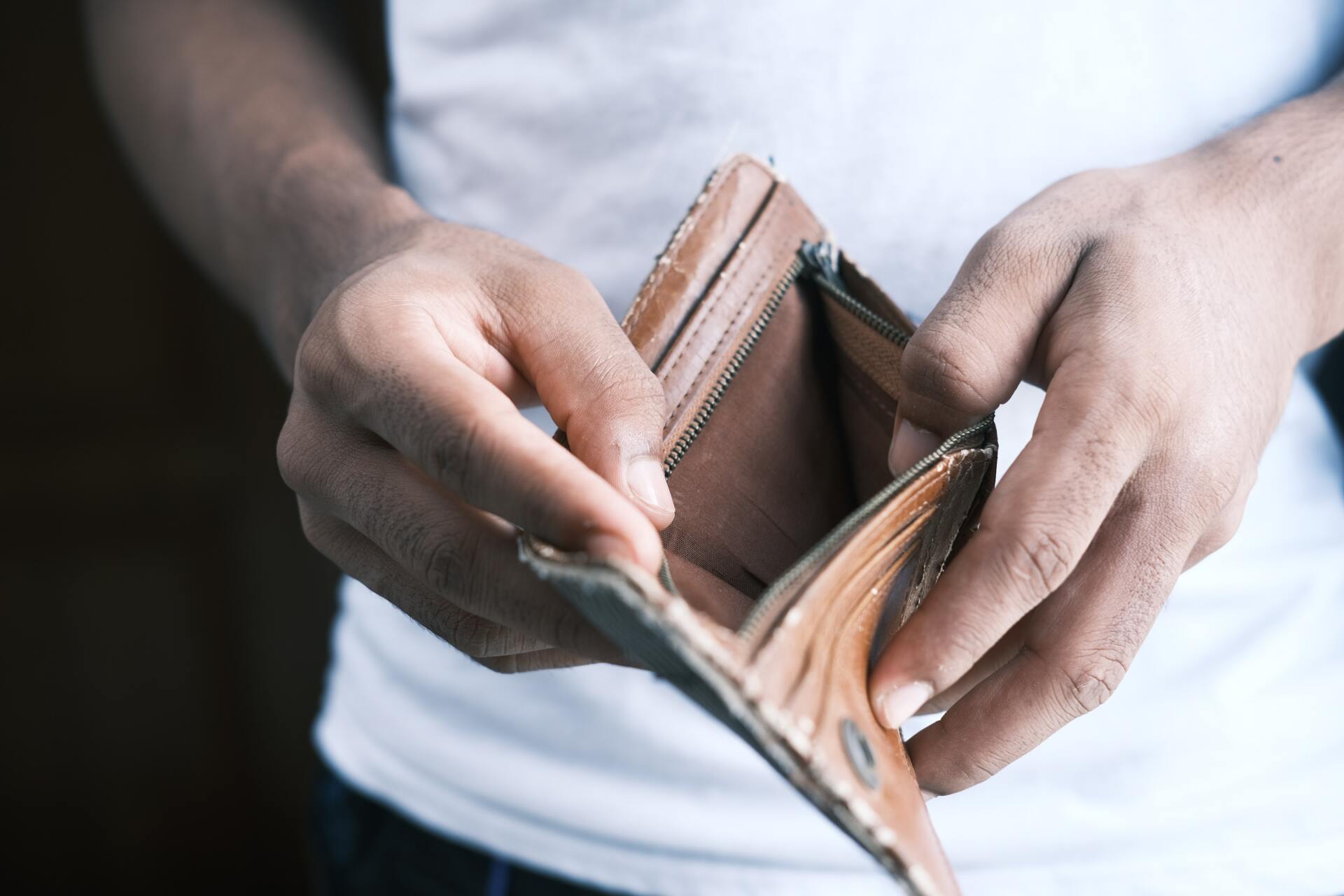Financial Distress- Signs You Should be Worried
Stephen Behrends • November 14, 2020
My years as a bankruptcy lawyer tell me how to know your finances are in trouble!

I have been handling bankruptcy cases and listening to people tell me about their financial problems for almost 42 years. Here are some of the clear signs of trouble.
No savings for emergencies. Everyone needs a little cash set aside for unexpected problems or glitches. If you have none or if yours has been depleted, you will have no cushion if even small problems come up.
Using one credit card to make the minimum payments on another card. This use "Peter to pay Paul" is a sure sign that things are getting out of control.
Using credit cards to buy groceries or medication. This is another sure indication that you are digging deeper into debt.
Borrowing money from family or friends. It is good to have family and friends who can help when you need it but it is also an indication that things are going downhill.
Using payday or internet loans. These are popular ways to keep things going where there is "more month than money" left after payday. Things will start to spiral out of control fairly quickly because of the way these lenders insist on pre-authorized payments from your bank account and also because their interest rates are sky high.
Collection notices or phone calls. If things have gone to a collection agency, it is a sure sign that you are going to need help to sort out your financial problems.
Deferred doctors appointments, maintenance on your home or your vehicle or inability to fill your prescriptions when needed.
What should you do if you find yourself with one of more of the situations described above?
Ask for help! There are local and national non-profit groups, like Nonprofit Free Credit Counseling (www.nfcc.com), that specialize in debt counseling and payment plans. Call us if you want to see how it would work if you filed bankruptcy because often it is misunderstood and there are many popular misconceptions. For example, a discharge in a bankruptcy case followed by active efforts to rebuild your credit will often result in better credit ratings sooner than you would have with a debt payment plan.
But recognize that these signs mean serious financial problems could be on the way if they aren't addressed.
Bankruptcy Attorney Q & A- (Part 2) How Soon After Bankruptcy Can I Get an FHA Loan and Buy a House?
Bankruptcy Attorney Q & A- (Part 2) How Soon After Bankruptcy Can I Get an FHA Loan and Buy a House? Clients frequently ask about future credit after bankruptcy and especially about if they will ever be able to buy a home. The answer to this question is not always as simple as it should be because it varies by the type of home loan. This blog addresses special mortgages backed directly by the federal government such as Federal Housing Administration first time home buyer and rehabilitation loans. If you do not qualify for one of these loans, you should read our related blog on conventional mortgages and buying a home after bankruptcy. Just paste this link into your browser window: https://www.oregon-attorneys.com/bankruptcy-attorney-q-a-how-soon-after-bankruptcy-can-i-buy-a-house The short answer is that a waiting period of one to three years after filing for bankruptcy is all that is required for Federal Housing Administration, Veterans Administration and US Department of Agriculture Rural Home Loans. But this is just as to the bankruptcy filing. Of course, you still need to take active steps after bankruptcy to rebuild your credit. Check out our blog posts on rebuilding your credit after bankruptcy https://www.oregon-attorneys.com/5-steps-to-rebuilding-your-credit https://www.oregon-attorneys.com/filing-bankruptcy-is-just-the-first-step-in-rebuilding-your-credit And, you have to have sufficient income, possibily a down payment and a good debt to income ratio to buy a house. A Chapter 7 or Chapter 13 bankruptcy will show on your credit report for 10 years and negatively affect your credit. However, loans targeted to special populations and backed by the federal government have rules that allow you to buy a home shortly after discharge. These rules are subject to change so we recommend that you consult a mortgage broker for the most up to date standards for qualifying. Here are the waiting periods for these loans so you can buy a house. ● If you otherwise qualify for an FHA loan, you must wait at least 2 years after a Chapter 7 discharge or 1 year after a Chapter 13 discharge. ● If you otherwise qualify for a VA loan, you must wait at least 2 years after a Chapter 7 discharge or 1 year after a Chapter 13 discharge. ● If you otherwise qualify for a USDA loan, you must wait at least 3 years after a Chapter 7 discharge or 1 year after a Chapter 13 discharge. In addition, if you are in a Chapter 13 plan and you need to refinance, then FHA and VA can also help you. FHA loans used to refinance a home while in a Chapter 13 bankruptcy require up to 2 years of on time payments to the Chapter 13 trustee. You must also meet the other loan standards such as sufficient income and appropriate loan to value ration. But the loan proceeds must allow you to conclude your Chapter 13 plan as of the closing of the loan. We sometimes call this buying out your plan. This can work well if you have the equity. It is also possible to use VA loans to refinance a home while in a Chapter 13 bankruptcy. You need up to 2 years of on time payments to the Chapter 13 trustee. You must also meet the other loan standards such as sufficient income and appropriate loan to value ration. But you do not need to buyout your plan. Here is a brief description of these home loans. ● FHA first time home buyer loans allow for a low down payment currently at 3.5% with a credit score at or above 580, or 10% if your credit score is between 500-580. The property needs to pass an inspection. And there is a cap on these loans that varies by county. For example, a home in Lane County can qualify up to $420,000 but in Multnomah County that amount is $598,000. ● FHA rehabilitation loans have similar standards. However, the loan can include cash out to bring the home up to the required inspection standards. The cash out is limited to $35,000 for qualifying improvements such as replacing roofing, enhancing accessibility for a disabled person or making energy conservation improvements. ● VA loans for new home purchase start with a Certificate of Eligibility (COE) to show your lender that you qualify based on your service history and duty status. This is obtained from the VA. The VA does not always require a down payment but one may be needed depending on the amount of the loan. The property needs to pass an inspection. But unlike the FHA, the VA does not set standards for the loans as to credit or income. Typical lenders do want minimum credit scores in the 600 range. ● USDA rural home loans do not require a down payment. But the home and its location are essential to obtaining this type of mortgage. For example, the house size is usually 2000 square feet or less. In fact, the home buyer must need the home to have decent, safe, and sanitary housing and be unable to obtain a loan from other resources on terms and conditions that can reasonably be expected to be met. Income qualifications are lenient as the loan can include a payment subsidy and are only available to low income borrowers. The USDA doesn't have a fixed credit score requirement, but most lenders require a score of at least 640, and 640 is the minimum credit score you'll need to qualify for automatic approval through the USDA's automated loan underwriting system. Conventional loans require a longer waiting period between bankruptcy discharge and requesting a home loan. These types of loans are not guaranteed by the federal government and can require significantly longer waiting periods. But your state or local government may have other programs that can also help. And a bank involved in the Community Reinvestment Act (CRA) will also have loans available for low to moderate income home buyers. Finally, if you were impacted by recent fires and lost your home in such a disaster, the Small Business Administration and FEMA may have loan options to rebuild. Filing bankruptcy is usually just the first step to rebuilding your credit and putting yourself back on track to possible home ownership in the future.
Bankruptcy Attorney Q & A - How Soon After Bankruptcy Can I Buy a House? Clients frequently ask about their future credit ratings after bankruptcy and especially about being able to get a mortgage to buy a house. The answer to this question is not always simple as it varies by the type of mortgage. This blog addresses conventional home loans. If you qualify for a FHA or VA loan, you should read our related blog. Just pasted this link into your browser window https://www.oregon-attorneys.com/bankruptcy-attorney-q-a-part-2-how-soon-after-bankruptcy-can-i-get-an-fha-loan-and-buy-a-house The majority of conventional home loans are sold with in 6 months by the original lender. Fannie Mae and Freddie Mac are the largest purchases of these home loans, buying upwards of 65% of the annual home loans. We call this the secondary mortgage market. The rest of these loans are purchased by banks, hedge funds and asset backed trusts. Over the life of a 30 mortgage, it may be sold several times. A bankruptcy or other major negative credit event will create a waiting period before you qualified for a home loan that can be purchase by Fannie Mae or Freddie Mac. Many original lenders want the home loans qualified for purchase by Fannie Mae and Freddie Mac. So they try to meet Fannie Mae and Freddie Mac standards in all cases. Here are the waiting periods for these home loans to be qualified for purchase by Fannie Mae and Freddie Mac. • A Chapter 7 or Chapter 11 Bankruptcy waiting period is 4 years from the discharge or dismissal date of the bankruptcy action. A 2 year waiting period is allowed if extenuating circumstances are documented. • A Chapter 13 Bankruptcy waiting period is 2 years from the discharge date or 4 years from the dismissal date. This shorter waiting period after discharge recognizes that borrowers have already met a portion of the waiting period within the time needed for the successful completion of a Chapter 13 plan. A borrower who was unable to complete the Chapter 13 plan must wait 4 years. A 2 year waiting period is allowed if extenuating circumstances are documented as to a dismissed case. • A borrower who filed more than one bankruptcy within the past 7 years has a 5 five-year waiting period from the most recent dismissal or discharge date. However, two or more borrowers with individual bankruptcies are not cumulative, and do not constitute multiple bankruptcies. For example, if the borrower has one bankruptcy and the co-borrower has one bankruptcy this is not considered a multiple bankruptcy situation requiring a 5 year waiting period. A 3 year waiting period is allowed if extenuating circumstances are documented and is measured from the most recent bankruptcy discharge or dismissal date. But the most recent bankruptcy filing must have been the result of the extenuating circumstances. You still need to rebuild your credit and avoid accumulating a lot new debt to before you can buy a house. And you have to have sufficient income and a good loan to value ratio to buy a house so you can meet the standards to qualify for a home loan. Check out our blog posts on rebuilding your credit after bankruptcy. Just paste these links into your browser window: https://www.oregon-attorneys.com/5-steps-to-rebuilding-your-credit https://www.oregon-attorneys.com/filing-bankruptcy-is-just-the-first-step-in-rebuilding-your-credit These bankruptcy waiting periods may or may not be better then the alternatives. Here are the waiting periods for non-bankruptcy major negative credit events. • Foreclosure requires a 7 year waiting period measured from the completion date of the foreclosure action as reported on the credit report or other foreclosure documents provided by the borrower. A 3 year waiting period is allowed if extenuating circumstances are documented. • Foreclosure and Bankruptcy on the Home Loan. If a home loan was discharged through a bankruptcy, the bankruptcy waiting periods is applied if the new lender can document that the mortgage obligation was discharged in the bankruptcy. Otherwise, the greater of the applicable waiting periods applies. • Deed-in-Lieu of Foreclosure, Pre-foreclosure Sale (often called a short sale), and Charge-Off of a Mortgage Account require a 4 year waiting period from the completion date of the deed-in-lieu of foreclosure, pre-foreclosure sale, or charge-off as reported on the credit report or other documents provided by the borrower. These events are alternatives to foreclosure. A 2 year waiting period is allowed if extenuating circumstances are documented. • A deed-in-lieu of foreclosure is a transaction in which the deed to the real property is transferred back to the servicer. These are typically identified on the credit report through Remark Codes such as “Forfeit deed-in-lieu of foreclosure.” • A pre-foreclosure sale or short sale is the sale of a property in lieu of a foreclosure resulting in a payoff of less than the total amount owed, which was pre-approved by the servicer. These are typically identified on the credit report through Remark Codes such as “Settled for less than full balance.” • A charge-off of a mortgage account occurs when a creditor has determined that there is little (or no) likelihood that the mortgage debt will be collected. A charge-off is typically reported after an account reaches a certain delinquency status and is identified on the credit report with a manner of payment (MOP) code of “9.” Additional requirements may apply, especially when seek a shorter extenuating circumstances period. Only the purchase of a principal residence is permitted. Only limited cash-out refinances are permitted. You may need a larger down payment. For the purchase of second homes or investment properties and large cash-out refinances you must wait the full 7 years. These rules are subject to change, so one should consult a mortgage broker for the most up to date requirements for buying a home.









Share On: